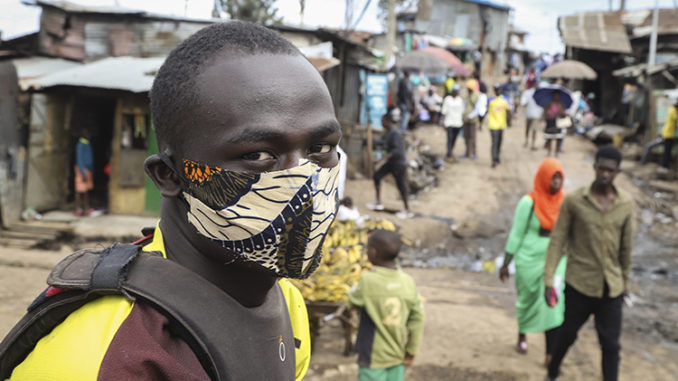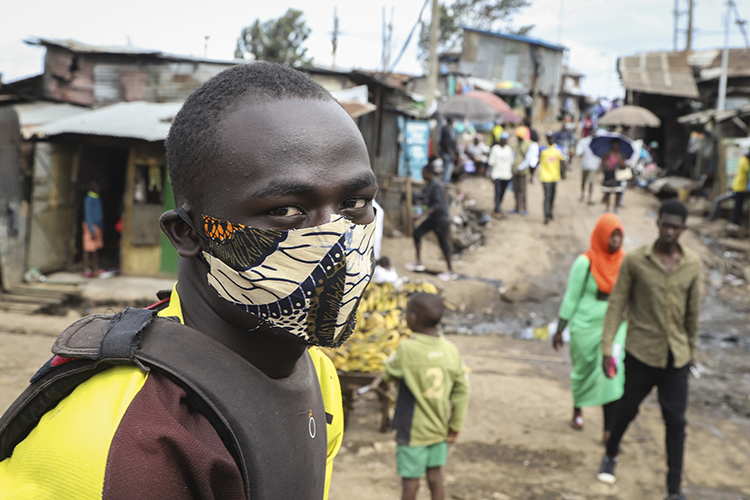

The first cases of COVID-19 emerged in China last November, and the virus has since moved inexorably to Europe and the United States. The virus didn’t arrive in Africa — home to 1.2 billion people — until the end of February, when a case emerged in Nigeria.
That delay gave doctors and public health experts on the continent valuable time to absorb best-practice strategies, says UC Berkeley economist Edward Miguel. But still, he said, the continent remains profoundly vulnerable.
African health care systems have improved substantially in the 21st century, but they remain “severely deficient,” Miguel said, and many government systems are fundamentally weak. His conclusion: Without robust international support, the pandemic’s effect in Africa could be devastating.

Berkeley economist Edward Miguel, the Oxfam Professor in Environmental and Resource Economics and faculty director of the Center for Effective Global Action (CEGA).
While some countries have already moved to shut down transportation and schools, Miguel said he remains worried.
“There are low-capacity governments, a lack of health facilities and a risk that health providers will come down ill,” he added. “And this comes at a unique moment, where the international community won’t have the capacity to help, in the short run, because the rich countries are dealing with their own problems” related to COVID-19.
Miguel is the Oxfam Professor in Environmental and Resource Economics and faculty director of the Center for Effective Global Action (CEGA), and he’s recognized as a specialist in African economics at the human scale. Today, his research team is scrambling to revise a planned survey in Kenya to include questions about the response to the pandemic.
Many countries in sub-Saharan Africa have seen remarkable economic growth and development in the past 20 years, driving a sense of optimism about the future of a continent that has long suffered from poverty, colonialism and political instability. Now, a pandemic could put these countries to an unprecedented test, with millions of lives — and the future itself — in the balance.
Berkeley News: What are Africa’s vulnerabilities in dealing with the coronavirus health emergency? And does Africa have strengths that might be important in this moment?
Edward Miguel: The more I think about it, the more I’m worried about what the next month or two will look like in Africa. But I’m glad you framed the question that way, because African countries do have some strengths over the countries that have been affected so far.
African populations are very young. The median age in a lot of countries is 20 or 18, much younger than in Europe, and it appears that young people who are infected are often asymptomatic or just get a cold. Italy has one of the oldest populations in the world, and we know that folks over 50 or 60 are particularly vulnerable to this disease. That could mean that the proportion of people who die could be lower in African countries.
Two other strengths come to mind: Even though Africa is rapidly urbanizing, a large share of the population in many countries still lives in rural areas. In the parts of Western Kenya where I work, people typically live in a homestead surrounded by their farmlands. They grow their own food. That may be a situation in which social distancing is pretty natural.
Another strength is the regional experience in sub-Saharan Africa dealing with Ebola in the last five or six years. There was infrastructure put in place to screen people, to contain an epidemic. I know Ebola and COVID-19 are quite different, but that capacity may help now.
And Africa has 30 years of dealing with the HIV/AIDS epidemic. Partially due to local initiatives, partially due to global aid initiatives, African health systems are much stronger than they were 20 years ago, or 15 years ago.
Still, you’re worried.
Even though health infrastructure has improved, in some ways, it remains severely deficient. Most sub-Saharan African countries have very few beds in hospital intensive care units. Some articles I’ve read say Kenya has only 155 ICU beds — for a country of 50 million people.
That’s terrifying. If there’s a significant outbreak, even if there aren’t as many vulnerable elderly people, millions of people still could be affected. Very few will have the care they need with ventilators and other advanced treatment.
The lack of trained staff is also a vulnerability. In many African countries, the numbers of doctors and nurses per capita are already among the lowest in the world. There’s a very real possibility that if some of them get sick, there won’t be much capacity left. We’re seeing this now in Italy, and the Italian system has many more resources.
Another major concern is that in many African countries, somewhere between 3% to 10% of the adult population are HIV-positive, in a few countries more than 15%. It’s still not established whether people who are HIV-positive are more susceptible to the virus, but it’s a concern that they might have weakened immune systems.
Government institutions have enormous power to shape the response to the crisis — through financial support, shelter-in-place policies and effective communication. But does Africa have those capable governance structures?
That’s really a key question. There’s a huge amount of variation across African governments. Some African countries — like Botswana or Rwanda, South Africa, to some extent Ghana and Senegal — have quite good governance. The government of Kenya is somewhere in the middle. But then, many other African countries have low-capacity governments.
Countries like South Sudan, the Democratic Republic of Congo are low-capacity governments in a region with porous borders. They may not be able to enforce lockdowns or social distancing. They may be dealing with armed conflict.

Africa’s experience in controlling the deadly Ebola virus has given the continent experience that may be valuable against the COVID19 pandemic. (Photo by Medici con l’Africa Cuamm via Flickr CC BY-SA 2.0)
Is a shelter-in-place order viable in an African country where poverty is endemic and governance may be weak?
Relatively few people in Africa can work at home. If you live in the countryside, you can grow your own food. But in a city, what are people going to do if they’re hungry, or they’re poor? They don’t have much in the way of savings, and they can’t work during a lockdown.
There’s going to need to be large-scale government and foreign aid programs, probably through cash transfers to put money in people’s hands. But if people are living in lockdown, and they can’t work, and the economy is shut down, if money doesn’t come, what will they do? Their immediate reaction could be: “I’m going to find a way to go back to my home in a rural area, where I have relatives who have food.” But all those people moving around are going to spread the virus.
The only way to enforce it may be through the threat of violent coercion. To some people, that may seem like an appropriate thing to do in a public health emergency. But it could have severe consequences.
You’ve done research on how climate change and natural disasters can cause political instability in countries that are less developed and more fragile. Do you think the coronavirus crisis could destabilize African countries?
I’m very concerned that people who are desperate will rise up against incompetent governments because they want to save their lives. They might want to put a competent government in its place.
But rallies and protests and mass movements may be off the table in the middle of an epidemic. So, how will people respond? Maybe, at least in the short run, that will create some surface stability, if people are afraid to venture outdoors. But if people are sufficiently worried and desperate, there could be political instability.
Governments that don’t have very high bureaucratic capacity and don’t have very well-developed public health systems may resort to the army to enforce rules to contain the pandemic. In many African countries, the army is the best-functioning and strongest institution. That immediately raises the risk of violence and political instability.
International partnerships have been crucial for Africa’s recent growth and development. But if China and the United States and Europe are preoccupied with this outbreak, what kind of support can be expected?
There will need to a response by the international community, by the WHO (World Health Organization) and the World Bank, and by traditional donors — the U.S., Europe and, increasingly, China. The problem is the U.S., Europe and China are in the middle of their own epidemics.
Maybe two months or three months from now, we’ll have things more or less under control in the U.S. and Europe. If the epidemic continues to spread in Latin America and Africa and in South Asia, maybe that’ll be a point in which rich country resources might be available.
For example, new technologies that are developed for rich countries might flow to poorer countries. If someone comes up with a super-cheap, super-easy coronavirus test in the next few weeks, maybe that can be deployed to African countries before the epidemic there has totally taken off. Or maybe all the research will yield a vaccine sooner than we think, and that could be deployed in sub-Saharan Africa, and to South Asia and Latin American countries.
If you’re a policymaker in Washington or Brussels or Beijing, why do you need to be concerned about what’s going on in Africa?
Policymakers should care about sub-Saharan Africa for humanitarian reasons. But there are at least two other reasons. One is geopolitical: In the coming weeks and months, the Chinese, Japanese, Europeans, Americans — they’re going to want to prove that they have influence in Africa, and each may want to outdo the others in helping African countries to combat the pandemic.
There’s another rationale that’s more selfish, but understandable. We might get the epidemic under control here, but if there are waves of the epidemic in African countries, in India, in Bangladesh, in Brazil, we know that it might eventually spread back to us.
So the COVID-19 pandemic demands a global, collective response. It is in the self-interest of the United States to deal with the epidemic globally to make sure it doesn’t break out again.
Africa faces grave risks as COVID-19 emerges, says Berkeley economist

Be the first to comment